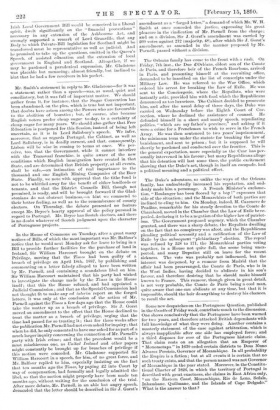Mr. Smith's statement in reply to Mr. Gladstone—for it was
a statement rather than a speech—was, as usual, quiet and conciliatory, but it was full of important matter. We should gather from it, for instance, that the Sugar Convention has been abandoned, on the plea, which is true but not important, that doubts have arisen among the Powers who are favourable to the abolition of bounties ; but, of course, also because English voters prefer cheap sugar to-day, to a certainty of cheap sugar for many years. We should also gather that Free Education is postponed for this Session, instead of being left uncertain, as it is in Lord Salisbury's speech. We infer, moreover, that as regards Portugal, the Cabinet, as well as Lord Salisbury, is in deadly earnest, and that, consequently, Lisbon will be wise in coming to terms at once. We per- ceive, too, that the Government, while it cannot interfere with the Transvaal franchise, is quite aware of the new conditions which English immigration have created in that State, and are determined that British property, at all events, shall be safe,—an intimation of real importance to the thousand and one English Mining Companies of the Boer State. Finally, we note with approval that the tithe fund is not to be whittled away for the benefit of either landlords or tenants, and that the District Councils Bill, though not promised, is ready, and will be brought forward if the Glad- stonians do not obstruct business,—a hint we commend to their better feeling, as well as to the remembrance of county electors. On Thursday, the debate presented no feature except Mr. Bryce's hearty approval of the policy pursued in regard to Portugal. Mr. Bryce has Scotch electors, and there is no doubt whatever of Scotch judgment upon the character of Portuguese projects.


































 Previous page
Previous page